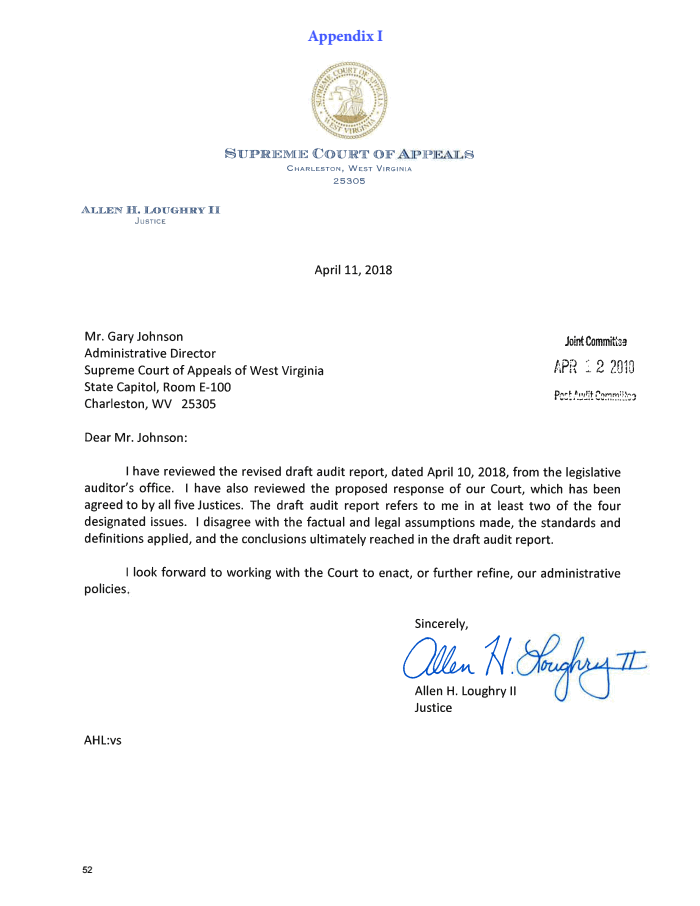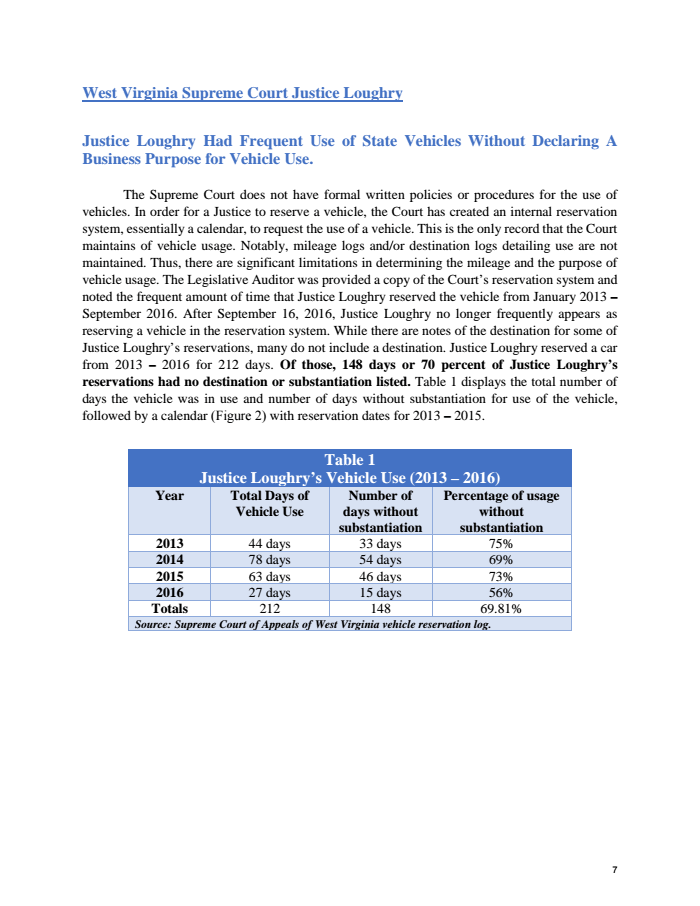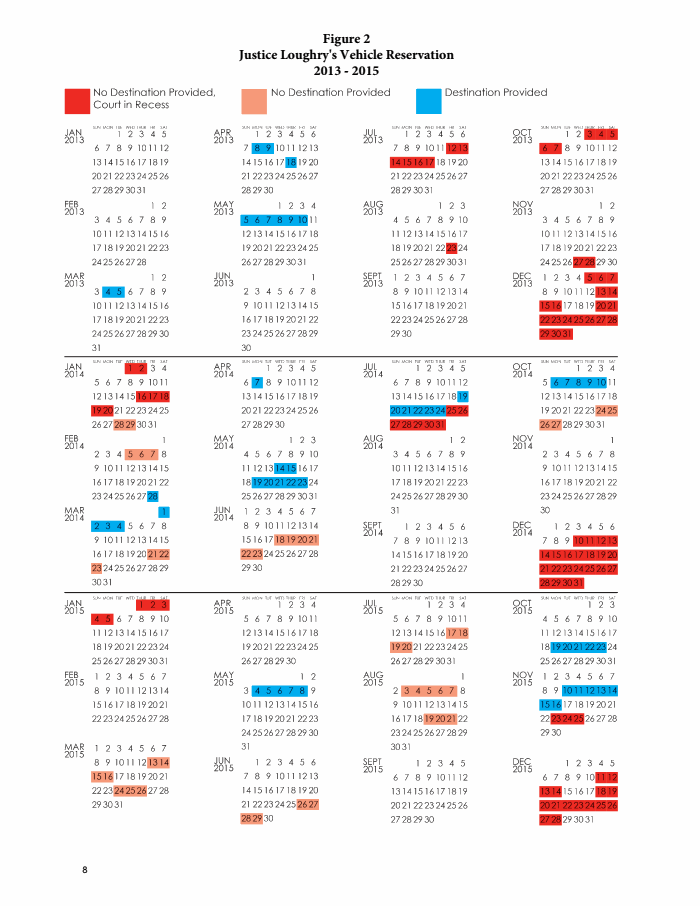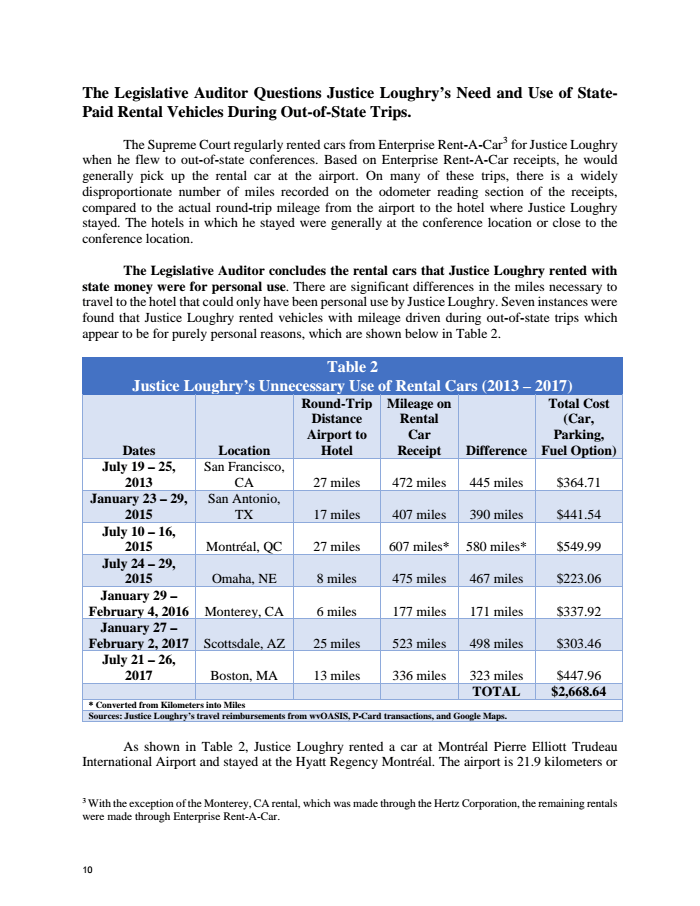CHARLESTON, W.Va. — Two state Supreme Court justices drove state vehicles for personal use without properly claiming the perk as a taxable fringe benefit, a legislative audit has concluded.
Justices Allen Loughry and Menis Ketchum also may have violated the state Ethics Act’s provision prohibiting the use of public office for private gain, the auditors wrote.
“The Legislative Auditor finds that the instances documented in this report, taken together with media reports, show a complete lack of regard for the principles of fiscal prudence and responsibility,” auditors wrote in the report that was released Monday morning.
MORE: Read the legislative audit of the West Virginia Supreme Court.
This was considered part one of the Legislative Auditor’s examination of Supreme Court spending.

The legislative audit is the latest revelation about the spending habits of former Chief Justice Loughry, who lost that title but remains on the court.
The legislative audit also focuses on Justice Ketchum, who regularly used a state-owned Buick to commute to the court from his Huntington home. Ketchum also took the car to several out-of-state golf outings.
The findings were presented Monday morning to the Post Audits Subcommittee, which represents leaders from both houses of the Legislature.
The audit concluded that the state-vehicle use should have been reported as income on federal tax filings by the justices.

Ketchum had his W-2 forms retroactively updated to reflect that, the audit states. Ketchum also repaid the state $1,663.81 for incorrect travel expenses.
Loughry submitted a memo disputing the results of the audit.
“I disagree with the factual and legal assumptions made, the standards and definitions applied, and the conclusions ultimately reached in the draft audit report,” Loughry wrote.

A separate memo submitted by current Chief Justice Margaret Workman says the court is in the process of revising its travel-related policies.
Workman’s memo says the court cooperated with the audit and will continue to do so.
“It was agreed that there would be continued communication and a joint cooperation in continuing to improve fiscal procedures and accountability,” Workman wrote.
Workman appeared Monday morning before the legislative committee and made similar comments there. She said the justices should have been more attentive to rules surrounding vehicle use but got busy with non-administrative aspects of their work.
“We were busy being judges and not perhaps paying enough attention to administrative things. That has changed. Our policies going forward are going to be much tighter,” Workman said Monday morning.
Loughry and Ketchum did not appear before the legislative committee.
West Virginia Supreme Court justices are paid $136,000 a year.
From couches to cars
The audit was announced after the Supreme Court had already gone through several rounds of controversies over spending.
Stories by WCHS-TV about renovations in the court focused on a $32,000 couch in Loughry’s office, the $7,500 wooden West Virginia medallion inlaid into Loughry’s floor, the $28,194 rugs in Justice Robin Davis’s office and the $130,654 for extensive renovations of Justice Beth Walker’s chambers, even though those chambers were upgraded just seven years ago.
Controversy then erupted over Loughry’s possession at his home of an antique desk associated with famed architect Cass Gilbert from when the state Capitol was first built. The audit, which valued the desk at $42,000, briefly delved into the desk issue, concluding it was another example of using public office for private gain.
The Legislature, during the most recent regular session, passed a resolution that would provide greater legislative oversight for the court system’s budget. Voters would have to approve the proposed amendment to the state Constitution during November’s election.
The legislative audit discussed Monday morning shifted focus to the Supreme Court’s three Buicks — a 2007 Lucerne, a 2009 Lucerne and a 2012 LaCrosse. They are supposed to be used by the court for business purposes.
The audit found that Ketchum used the 2007 Lucerne for more than four years to commute from his home in Huntington and for golf outings in Virginia.
Loughry used both the 2009 Lucerne and the 2012 LaCrosse, along with additional court vehicles, for multiple periods of undocumented use.
The Legislative Auditor questioned whether Loughry’s use of the state vehicles was truly for business purposes — or may have been for a mix of business and pleasure travel.
The report concluded that the use of the vehicles should have been — but was not — included on their W-2 forms as a taxable fringe benefit.
There was evidence that Loughry and Ketchum knew they should have reported the fringe benefit as taxable income, but they still didn’t do it, the legislative audit concluded.
Workman’s memo in response to the audit says the court is taking several actions.
That includes requiring full documentation — including the specific purpose of the use, the destination, the mileage in and out and the specific vehicle assigned — for any vehicle request for court employees or justices.
Ketchum’s car
Ketchum obtained official permission from his fellow justices in 2012 to start using a state vehicle to commute between the Capitol and his home in Huntington.
During that time, Ketchum used a state fuel card to pay for gasoline.
Over those years, the audit calculates, Ketchum drove the vehicle 78,423 miles, purchased fuel 312 times and spent a total of $12,250.04.
On about five occasions, Ketchum used the vehicle to travel to Virginia for golf outings. After being questioned about the trips by auditors, Ketchum reimbursed hundreds of dollars in calculated expenses.
Ketchum stopped using the state vehicle in 2016 but then began to submit mileage reimbursement for his commutes from home to the Capitol.
The reimbursement rate was 15 cents a mile.
Ketchum submitted for 131 reimbursements, amounting to $2,028.
The Legislative Auditor found that 16 of the justice’s reimbursement requests actually fell after the Supreme Court had ended its term — so he was not actually eligible for reimbursement. Ketchum repaid $249.60 for those instances.
Furthermore, the Legislative Auditor noted six instances when Ketchum was reimbursed for mileage associated with use of a personal vehicle when he actually had been using the Buick owned by the court — essentially, double billing.
Ketchum, after being informed about the instances, repaid the state another $1,495.33. He said an employee at the time must have made a mistake.
More trouble for Loughry
The legislative audit shows Loughry using state vehicles less consistently than Ketchum did — but with less clarity about how he was using them.
Auditors went over a calendar used by court officials to claim vehicles. Loughry reserved a car a total of 212 days from 2013 to 2016. Of those, 148 days had no destination or work purpose listed.
Many of Loughry’s reservations were in the months of December.
Auditors wrote, “Notably, Justice Loughry had a state vehicle for 27 consecutive days through the Christmas and New Year’s holidays from December 10, 2014, to January 5, 2015.
“The Supreme Court of Appeals was in recess during all the December dates, and no destination or substantiation is listed for any of these time frames. The Legislative Auditor is unable to find any purposes for which Justice Loughry used the vehicles during the December months.”
Supreme Court of Appeals 4 15 18 (Text)
The auditor wrote that other justices questioned in writing whether Loughry’s use of the state car was for business purposes, “to which Justice Loughry made it clear that in his view, he should not have to report a destination or a purpose.
“His position was that once he said he was traveling on state business, that should be the end of any inquiry.”
Loughry also rented vehicles during several trips out of state.
Auditors questioned whether Loughry’s mileage on the rented vehicles was in line with the stated business purpose of the travel.
“On many of these trips, there is a widely disproportionate number of miles recorded on the odometer reading section of the receipts, compared to the actual round-trip mileage from the airport to the hotel where Justice Loughry stayed,” the auditors wrote.
For example, on a trip to Montreal, Loughry stayed at a Hyatt Regency that was 13.6 miles from the airport. But, according to an Enterprise Rent-A-Car receipt, the car was driven 607 miles.
On a trip to Omaha, Nebraska, the distance between the airport and the hotel was 4 miles. Yet the rental vehicle was driven 475 miles.
Seven such trips cost the state $2,669.
“Based on this analysis,” the auditors concluded, “it appears possible that Justice Loughry, or a travel companion allowed to use rental cars, vacationed on the state’s dollar.”
W-2s
Legislative auditors concluded that under Internal Revenue Service regulations, any use of the state vehicles not for business purposes should have been considered a taxable fringe benefit.
Commuting is specifically excluded from the definition of business use.
And, without records documenting business and personal mileage separately, then the value of all use of the vehicle is considered taxable income.
The Supreme Court has not complied with federal tax law, the state auditors concluded.
The Supreme Court should have included the taxable fringe benefits on justices’ W-2s between 2012 and 2017, the auditors wrote.
The auditors concluded that by 2016, the Supreme Court was clearly aware of the tax problem.
The auditors cited a July 21, 2016, memo written by a former administrative counsel for the court, informing then-Administrative Director Steve Canterbury. The memo was written at the request of Justice Robin Davis.
Justices themselves then discussed the use of state vehicles during a September, 2016, administrative conference.
“Thus, the justices and the Administrative Office of the Supreme Court of Appeals were clearly informed of the Court’s responsibility to properly account for the justices’ use of state vehicles and report the taxable fringe benefit associated with this use to the IRS,” the auditors wrote.
Justice Workman wrote in her memo that the IRS audited the Supreme Court from April 2017 through early 2018.
She wrote that based on the IRS’s audit resolution process,the court does not believe it is necessary to issue any revised or amended W-2s from 2014 through the present.
Justice Ketchum did ask for and receive amended W-2s for the period in question, though.
Workman’s memo says that based on IRS guidance, payments for commuting should always be considered taxable income from here on out.
The auditors said the court should have dealt with the tax implications years ago.
“The decision by the Court to not follow federal and state tax laws is particularly troublesome given the substantial evidence that suggests the Court did, in fact, know how to properly calculate and apply the taxable income from these fringe benefits going back to at least 2012.”





